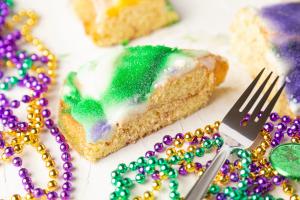A Word From Dave Brennan from King King Cakes
— Dave Brennan
NEW ORLEANS, LOUISIANA, UNITED STATES, September 6, 2023/EINPresswire.com/ — As Mardi Gras season approaches, the cultural spotlight invariably falls on a vibrant, delectable, and historically rich item—the King Cake. This ring-shaped confection, awash in hues of purple, green, and gold, has evolved from its French origins to become a staple of Louisiana’s Mardi Gras celebrations. In an enlightening conversation about the history of King Cakes, we had the pleasure of speaking with Dave Brennan, owner of King King Cakes, known for their array of luxurious King Cakes in flavors such as original, cream cheese, chocolate, praline, strawberry cheesecake, and Bavarian cream.
“The King Cake is not just a dessert; it’s a symbol of unity and celebration deeply rooted in cultural traditions,” comments Brennan.
French Beginnings
The King Cake, originally known as the ‘Galette des Rois,’ has its roots in France. The cake was initially crafted to commemorate the Christian feast of the Epiphany, celebrating the visit of the Three Wise Men to Jesus. Traditional French Galette des Rois were made of puff pastry and filled with frangipane. The cakes would contain a ‘fève,’ a small trinket that bestowed temporary kingship upon the person who discovered it in their slice.
Journey Across The Atlantic
The tradition of the King Cake sailed across the Atlantic with French settlers who came to Louisiana in the 18th century. Through years of cultural amalgamation, the King Cake underwent several adaptations—switching from puff pastry to brioche dough and taking on the vivacious colors of Mardi Gras—purple, green, and gold, each representing justice, faith, and power, respectively.
Mardi Gras and The King Cake
Over time, King Cakes became inextricably linked with the Mardi Gras festivities. Running from the Feast of Epiphany to Fat Tuesday, King Cakes can be found at every event—be it family reunions, office parties, or grand parades.
“It’s more than just seasonal fare. When someone receives the slice with the trinket, they carry on the tradition by hosting the next King Cake event. It’s a chain of community,” adds Brennan.
A Kaleidoscope of Flavors
King Cakes today are an artisanal affair, blending traditional elements with modern culinary twists. Businesses like King King Cakes have played a role in elevating the King Cake experience. They offer flavors that range from the traditional to the sumptuously modern—cream cheese, chocolate, praline, strawberry cheesecake, and Bavarian cream, each a masterpiece in its own right.
“Our aim is to respect tradition while encouraging culinary innovation. Whether it’s the original cinnamon flavor or something more adventurous, we offer a King Cake for everyone,” Brennan notes.
More Than Just A Cake
The King Cake has transcended its traditional roots to become a significant part of the American cultural tapestry, symbolizing unity, festivity, and a shared heritage. As it gains popularity beyond the boundaries of Louisiana and Mardi Gras, the King Cake stands as a testament to the power of tradition and the magic of evolution.
“Each King Cake tells a story—a narrative of tradition, transformation, and the delight of sharing something special,” concludes Brennan.
Morgan Thomas
Rhino Digital, LLC
+1 504-875-5036
email us here
Visit us on social media:
Facebook
![]()
Originally published at https://www.einpresswire.com/article/654161836/the-fascinating-history-of-king-cakes-from-french-tradition-to-mardi-gras-staple





